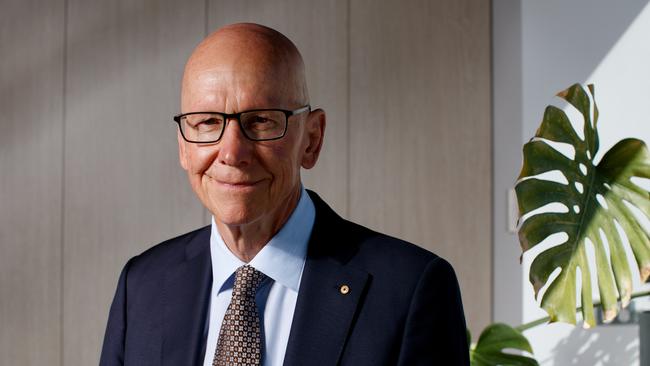‘Super tax puts SMSF industry at risk,’ WAM’s Geoff Wilson warns
Fund manager Geoff Wilson warns the proposed super tax risks destroying the trillion-dollar SMSF industry and will see investors instead opt for low-risk options that deliver steady returns.

Labor’s proposed tax on super balances above $3m risks destroying the trillion-dollar self-managed super industry and will see investors move down the risk curve as they hunt more steady returns, fund manager Geoff Wilson has warned.
Speaking to The Australian, Mr Wilson said the government’s planned super tax changes would see crucial risk capital pulled out of the system, with SMSFs to be hardest hit by the proposed rules.
“If you want to destroy self-managed super funds, then this is how to do it,” Mr Wilson said in an interview.
“Effectively, it’s removing a trillion dollars of risk capital from any Australian company that needs risk capital to grow. Those (self-managed) super funds would be better off putting the money into a bank and getting a 5 per cent return.”
Mr Wilson’s firm, the listed investment company specialist Wilson Asset Management, invests more than $5bn on behalf of 130,000 retail clients.
If Labor’s proposal goes ahead, savers with far less than $3m in super will change their behaviour to avoid the risk of pushing into the higher super tax bracket, he argued.
“Why would you take the risk that the value of your assets might increase a lot one year, and then fall a lot the next year, but you’ve still got to pay all this tax out?” Mr Wilson said.
“You’d just put it into cash so you don’t have the risk (of an investment recording large gains in a year and tipping over the $3m mark).”
Along with a potential dramatic shift in investment strategy that will see investors discouraged from providing “patient risk capital”, others may be forced to sell investments to meet the new tax obligations.
The proposed tax, which is set to come into effect in July 2025, moved a step closer last week when it passed in the House of Representatives, without any amendments, on Wednesday.
This is despite much criticism over both the government’s steadfast refusal to index the $3m threshold to inflation, meaning more Australians will be hit by the tax over time, and the move to tax both realised and unrealised gains on earnings over $3m.
It will now be debated in the Senate, where the government needs the backing of crossbenchers for it to be passed into law.
The move to tax unrealised gains was “grossly inequitable and unfair”, Mr Wilson said, with SMSFs much more disadvantaged than industry super funds due to the practicalities of managing cash flows to meet the proposed tax obligations.
He has previously proposed that for individuals with one fund, rather than multiple funds, taxing earnings over $3m could be easily calculated, removing any need to tax unrealised gains.
“There are many circumstances where the tax act allows taxpayers to make elections. We would propose that taxpayers who have only one ‘superannuation interest’ should be able to elect to have this additional tax applied to that one fund only and, as a result, only pay tax on actual realised taxable earnings,” he said in a submission on the proposed change earlier this year.
Mr Wilson has also criticised the decision to not index the threshold to inflation.
Initial estimates are that the changes will affect 80,000 superannuation balances. But this number will grow over time, with the Financial Services Council estimating about 500,000 super balances would eventually breach the $3m cap.
Mr Wilson’s comments were echoed by SMSF Association chief executive Peter Burgess, who warned the decision to tax unrealised capital gains set a dangerous precedent for tax change.
“The combination of taxing unrealised capital gains and no indexation will have a devastating impact on the venture and start-up sectors that rely so heavily on the SMSF sector for funding,” Mr Burgess warned in the wake of the proposed change passing the lower house last week.
“At a time when we need to lift economic growth, these sectors are a critical driver of productivity, and we should be focusing on measures that encourage this growth rather than stifling it,” he said.
“The decision to tax unrealised capital gains sets a dangerous precedent for tax change in this country, overturning nearly 40 years of a tax practice that delineated between income and capital gains tax, with the latter only payable on the realisation of an asset. And indexing tax thresholds is a long-established principle.”
Likewise, the National Farmers’ Federation has warned thousands of farmers could be hit by the new tax, with some being forced to sell their farms and homes to meet the tax bill, all because they hold the family farm in their self-managed super fund.





To join the conversation, please log in. Don't have an account? Register
Join the conversation, you are commenting as Logout